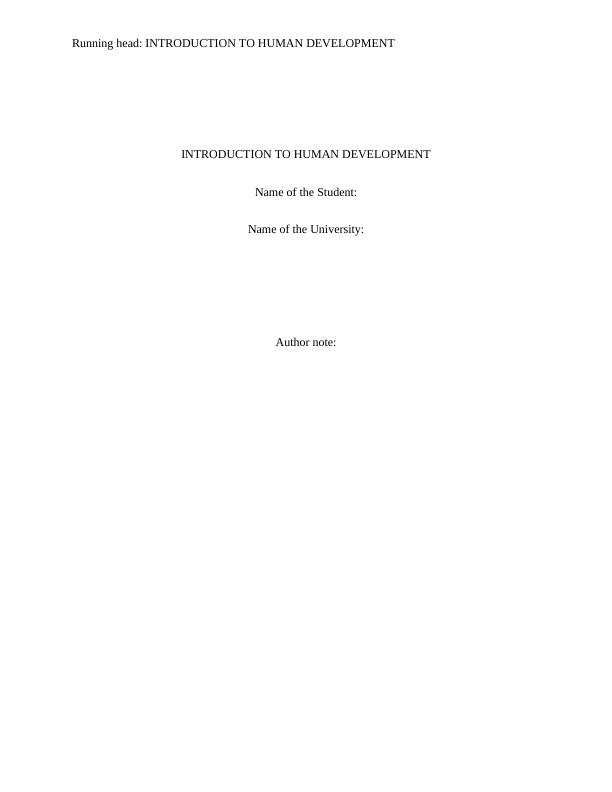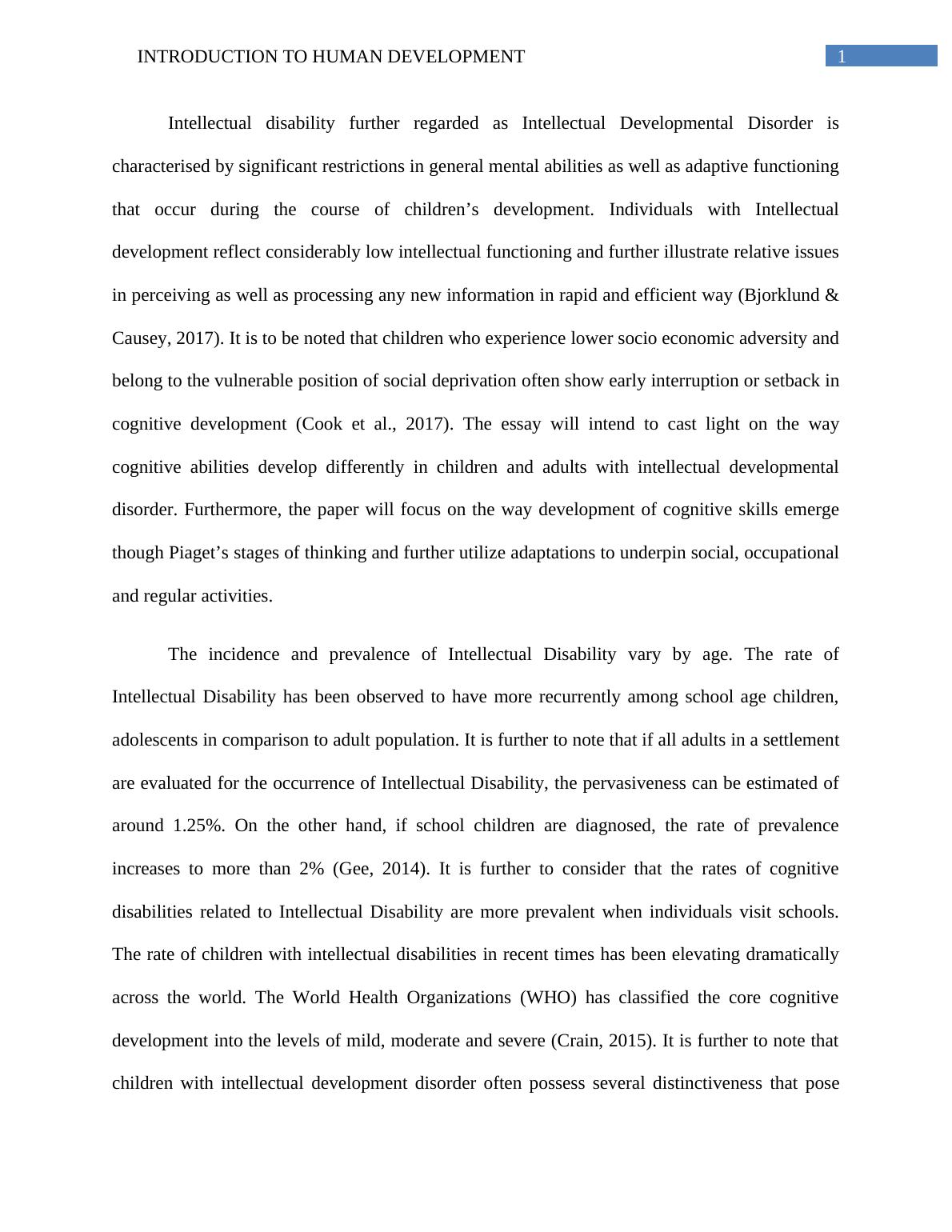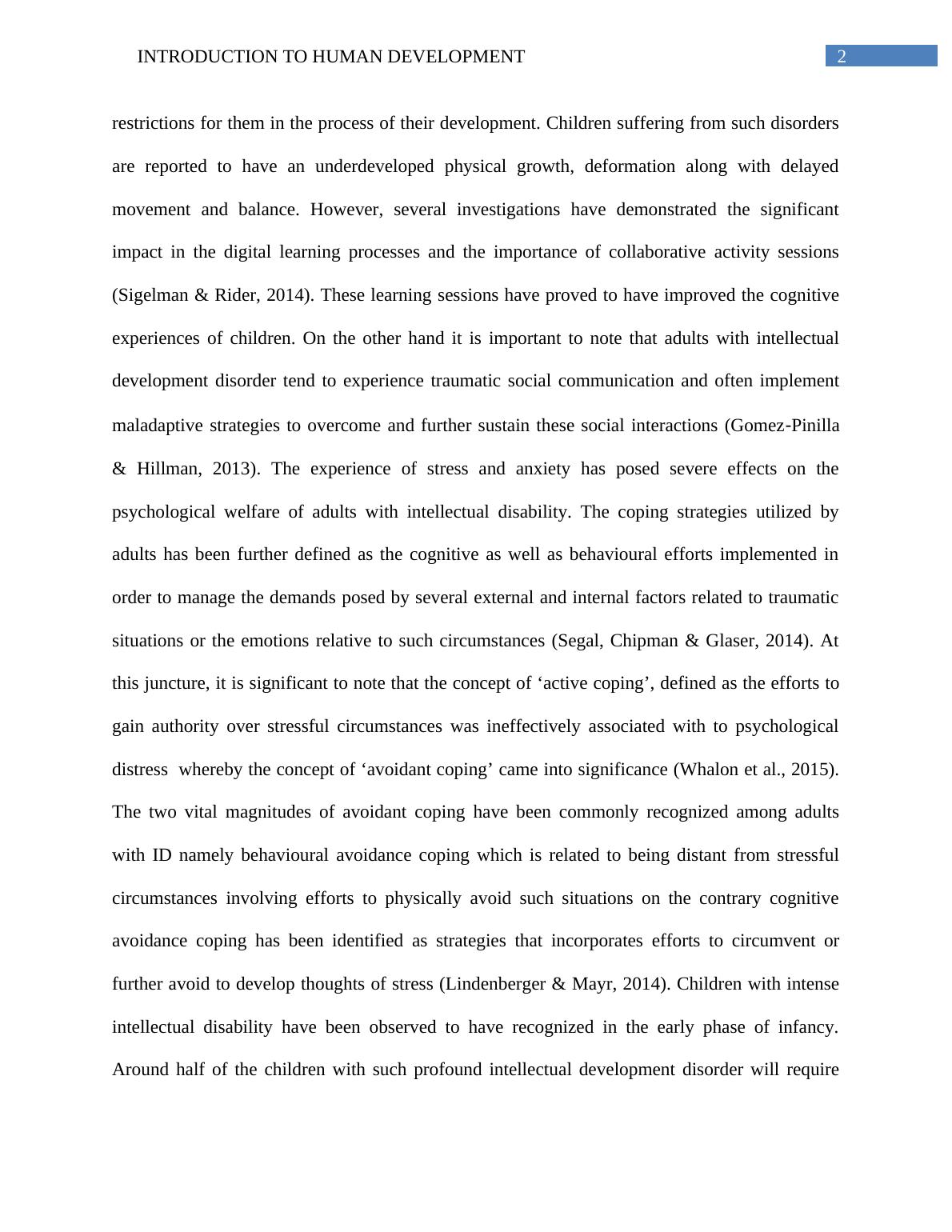Introduction To Human Development
Added on 2021-06-18
10 Pages2750 Words29 Views
Running head: INTRODUCTION TO HUMAN DEVELOPMENTINTRODUCTION TO HUMAN DEVELOPMENTName of the Student:Name of the University:Author note:

1INTRODUCTION TO HUMAN DEVELOPMENTIntellectual disability further regarded as Intellectual Developmental Disorder ischaracterised by significant restrictions in general mental abilities as well as adaptive functioningthat occur during the course of children’s development. Individuals with Intellectualdevelopment reflect considerably low intellectual functioning and further illustrate relative issuesin perceiving as well as processing any new information in rapid and efficient way (Bjorklund &Causey, 2017). It is to be noted that children who experience lower socio economic adversity andbelong to the vulnerable position of social deprivation often show early interruption or setback incognitive development (Cook et al., 2017). The essay will intend to cast light on the waycognitive abilities develop differently in children and adults with intellectual developmentaldisorder. Furthermore, the paper will focus on the way development of cognitive skills emergethough Piaget’s stages of thinking and further utilize adaptations to underpin social, occupationaland regular activities. The incidence and prevalence of Intellectual Disability vary by age. The rate ofIntellectual Disability has been observed to have more recurrently among school age children,adolescents in comparison to adult population. It is further to note that if all adults in a settlementare evaluated for the occurrence of Intellectual Disability, the pervasiveness can be estimated ofaround 1.25%. On the other hand, if school children are diagnosed, the rate of prevalenceincreases to more than 2% (Gee, 2014). It is further to consider that the rates of cognitivedisabilities related to Intellectual Disability are more prevalent when individuals visit schools.The rate of children with intellectual disabilities in recent times has been elevating dramaticallyacross the world. The World Health Organizations (WHO) has classified the core cognitivedevelopment into the levels of mild, moderate and severe (Crain, 2015). It is further to note thatchildren with intellectual development disorder often possess several distinctiveness that pose

2INTRODUCTION TO HUMAN DEVELOPMENTrestrictions for them in the process of their development. Children suffering from such disordersare reported to have an underdeveloped physical growth, deformation along with delayedmovement and balance. However, several investigations have demonstrated the significantimpact in the digital learning processes and the importance of collaborative activity sessions(Sigelman & Rider, 2014). These learning sessions have proved to have improved the cognitiveexperiences of children. On the other hand it is important to note that adults with intellectualdevelopment disorder tend to experience traumatic social communication and often implementmaladaptive strategies to overcome and further sustain these social interactions (Gomez‐Pinilla& Hillman, 2013). The experience of stress and anxiety has posed severe effects on thepsychological welfare of adults with intellectual disability. The coping strategies utilized byadults has been further defined as the cognitive as well as behavioural efforts implemented inorder to manage the demands posed by several external and internal factors related to traumaticsituations or the emotions relative to such circumstances (Segal, Chipman & Glaser, 2014). Atthis juncture, it is significant to note that the concept of ‘active coping’, defined as the efforts togain authority over stressful circumstances was ineffectively associated with to psychologicaldistress whereby the concept of ‘avoidant coping’ came into significance (Whalon et al., 2015).The two vital magnitudes of avoidant coping have been commonly recognized among adultswith ID namely behavioural avoidance coping which is related to being distant from stressfulcircumstances involving efforts to physically avoid such situations on the contrary cognitiveavoidance coping has been identified as strategies that incorporates efforts to circumvent orfurther avoid to develop thoughts of stress (Lindenberger & Mayr, 2014). Children with intenseintellectual disability have been observed to have recognized in the early phase of infancy.Around half of the children with such profound intellectual development disorder will require

End of preview
Want to access all the pages? Upload your documents or become a member.
Related Documents
Intellectual Disabilities Assignment PDFlg...
|10
|2910
|48
Special Education and Psychology of Special Childrenlg...
|6
|1672
|459
Disability Awareness: Learning Disability and Physical Disabilitylg...
|8
|1726
|303
Cognitive Developmental Theory: Piaget's Theory and Recent Researchlg...
|9
|2247
|168
Vulnerability to Socioeconomic Challengeslg...
|12
|3257
|11
Potential Threat of Irish Nation- Autism Spectrum Disorderlg...
|16
|4853
|15
